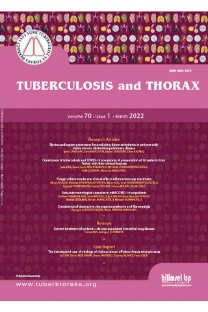Biyolojik ajan kullanan ağır astımlı hastalarda COVID-19
COVID-19 in patients with severe asthma using biological agents
___
- 1. Assaf SM, Tarasevych SP, Diamant Z, Hanania NA. Asthma and severe acute respiratory syndrome coronavirus 2019: current evidence and knowledge gaps. Curr Opin Pulm Med 2021; 27(1): 45-53.
- 2. Maes T, Bracke K, Brusselle GG. Reply to Lipworth et al. Inhaled Corticosteroids and COVID-19. Am J Respir Crit Care Med 2020; 202(6): 900-2.
- 3. Jesenak M, Banovcin P, Diamant Z. COVID-19, chronic inflammatory respiratory diseases and eosinophils-Observations from reported clinical case series. Allergy 2020; 75(7): 1819-22.
- 4. Lommatzsch M, Stoll P, Virchow JC. COVID-19 in a patient with severe asthma treated with omalizumab. Allergy 2020; 75: 2705-8.
- 5. Aksu K, Yesilkaya S, Topel M. COVID-19 in a patient with severe asthma using mepolizumab. Allergy Asthma Proc 2021; 42(2): e55-e57.
- 6. Eger K, Hashimoto S, Braunstahl GJ. Poor outcome of SARS-CoV-2 infection in patients with severe asthma on biologic therapy. Respir Med 2020; 177: 106287.
- 7. Hanon S, Brusselle G, Deschampheleire M. COVID-19 and biologics in severe asthma: data from the Belgian Severe Asthma Registry. Eur Respir J 2020; 56(6): 2002857.
- 8. Du RH, Liang LR, Yang CQ. Predictors of mortality for patients with COVID-19 pneumonia caused by SARSCoV- 2: a prospective cohort study. Eur Respir J 2020; 55(5): 2000524.
- 9. Eger K, Bel EH. Asthma and COVID-19: do we finally have answers? Eur Respir J 2021; 57(3): 2004451.
- ISSN: 0494-1373
- Yayın Aralığı: 4
- Başlangıç: 1951
- Yayıncı: Tuba Yıldırım
Using RV/LV ratio and cardiac biomarkers to define the risk of mortality from pulmonary embolism
Sümeyye AYÖZ, Serhat EROL, Melahat KUL, Aslıhan GÜRÜN KAYA, Ayşegül Gürsoy ÇORUH, İsmail SAVAŞ, Ömür AYDIN, Akın KAYA
SARS-CoV-2 enfeksiyonlu bağışıklığı sağlam bir hastada Geotrichum enfeksiyonu
Fatma YILDIRIM, Pınar Yıldız GÜLHAN, Meltem ŞİMŞEK
Deniz KÖKSAL, Sevinç SARINÇ ULAŞLI, Oğuz KARCIOĞLU, Ümran ÖZDEN SERTÇELİK, Sevgen ÖNDER, Emine KELEŞ, Elif BABAOĞLU
COVID-19 ilişkili akut solunum sıkıntısı sendromu: Patolojik, radyolojik ve klinik durum
Pınar YILDIZ GÜLHAN, Fatma YILDIRIM, Meltem ŞİMŞEK
Blood hyperreosinophilia: A diagnostic challenge
Gülden PAÇACI ÇETİN, Mehmet KÖSE, Bahar ARSLAN, İnsu YILMAZ
Göğüs hastalıklarında yapay zeka uygulamaları ve pandemi döneminde sağladığı avantajlar
Neslihan ÖZÇELİK, İnci SELİMOĞLU
Hipereozinofili: Tanısal zorluklar
İnsu YILMAZ, Mehmet KÖSE, Gülden PAÇACI ÇETİN, Bahar ARSLAN
Entübe hastalarda ortaya çıkan faringoözofagogastrik dismotilite: Güncel bir derleme
Ayşegül GÜRSOY ÇORUH, Aslıhan GÜRÜN KAYA, Akın KAYA, Melahat KUL, Serhat EROL, Ömür AYDIN, Sümeyye AYÖZ, İsmail SAVAŞ
